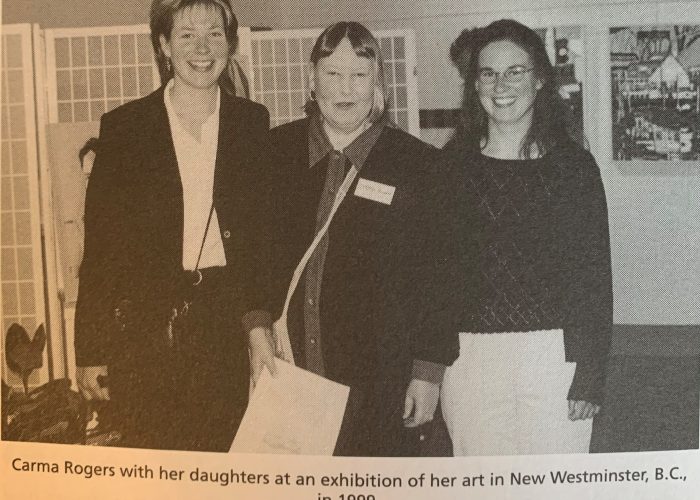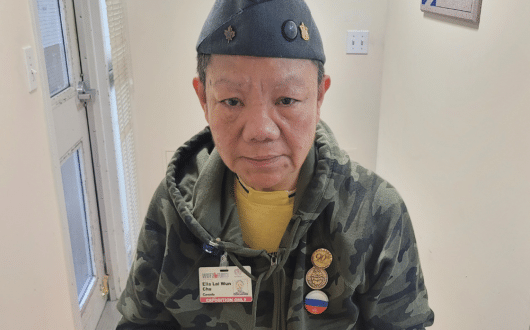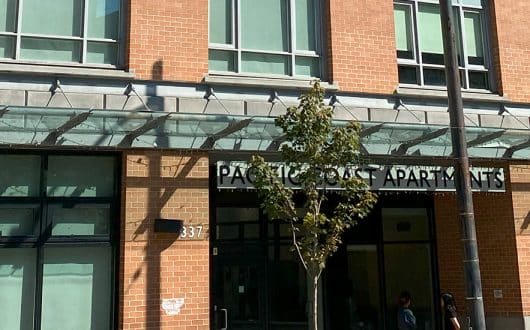Carma Murphy Rogers, Our Feature Artist for the 2020 Courage To Come Back Awards
“I’ve moved from a person who is identified as a schizophrenic to just a person.” Carma Rogers
Carma Rogers was born in a village in the Bay of Fundy in Nova Scotia. She had an extremely happy childhood where she felt loved and cherished and had a place in her family. Carma attended UBC and graduated with a degree in Education. It was in Vancouver that she met her former husband and after they were married moved to Montreal. Carma had two daughters, at this time in her life Carma felt she had found her place in the world. She and her family, purchased their first house, she loved being a mother, began to pursue her artistic talent by studying fine arts at night school.

At the age of 34 in 1974 Carma began to feel like she was having a “nervous breakdown”. She described this as happening quite suddenly where she began to think she knew people she met in another life, often feeling suspicious and fearful of other people. “I thought I was going crazy,” Carma said, “I thought it must have been something I’d done.” But nothing in her experience explained what was happening. But then, in the mid-1970’s, the symptoms persisted; she couldn’t remember if the paranoia and hallucinations came on suddenly or gradually. She had no family doctor, so she went to an outpatients’ clinic. At one, a psychiatrist prescribed drugs; her husband told her there was nothing wrong with her and she should flush the medication down the toilet, she did. But the symptoms persisted.
Her husband soon after announced he was leaving the family and Carma’s health continued to deteriorate. At this time a voice began to talk to her, giving her all kinds of commands which she felt compelled to respond to. She continued battling her symptoms, teaching full time and caring for her daughters for three years. When she could no longer cope, her children went to visit their father in Montreal and it was at this time she lost custody of them.

Art by Carma Rogers
Carma entered hospital care and after a brief stay she was released into a world where she had lost her children, her home and her income.
From the start of the onset of her mental illness, Carma’s overwhelming sense was one of shame. No one had told her what was wrong, she had never been introduced to any rehabilitation services or community support, and returned to live with her Mother in Nova Scotia. The most painful part of her experience was returning home without her children and without a job. She did not want to meet or associate with anyone because she felt she couldn’t explain this. During this 6 year period she was heavily medicated and still never given a diagnosis. She tried to return to university, but the effects of the medication made it impossible to read or concentrate. She describes her life as being in a chemical straitjacket. She felt like “absolute zero”. Her heart was broken at the loss of her children whom she believed she would never see again. One of her worst fears was that she would pass them on the street someday and not even recognize them.
Then in the 1980’s Carma’s aging aunt asked her to return to Vancouver to live with her. It was at this time that Carma found a mental health team and finally had a name for her diagnosis, Schizophrenia. Carma’s medication was radically reduced, and she had people to talk to and sort things out. She was able to paint again. She was determined to achieve something that would make her children proud of her, even though she still had no contact with them and didn’t even know where they were.
Carma continued in her rehabilitation process over the next few years and through that work she became engaged in the activities that were important to her and to develop relationships. She moved into Coast Mental Health’s housing. She began to volunteer at a local community centre and was offered the opportunity to take painting courses. Although she knew that she would not be able to work again as a teacher, she saw her talent as an artist as the opportunity to make her children proud. She tracked down her daughters, reestablished contact, and rebuilt their mother/daughter relationship. Carma described her life as ‘pretty normal’, “I’ve moved from a person who is identified as a schizophrenic to just a person. I’ve been able to find a lot of myself that I lost for many years. I have my painting and my daughters. I have a partner and my apartment. I’m all set.”
Carma said that the thing that bothered her most about mental illness is the stigma attached. She donated her time and personal story to several groups in Vancouver in the ongoing struggle to overcome this. Sadly Carma passed away in 2000 and is missed everyday by her community. Carma was a wonderful asset to the Coast community, and despite all the she has endured, was a woman of hope and compassion. Carma was a true example of our everyday heroe who had the courage to come back!

To see more of Carma’s artwork, you need to look no further than this year’s stunning Courage To Come Back creative. Stay tuned to see it woven through Courage’s media in the upcoming weeks!
For more information on Coast Mental Health’s Courage To Come Back Awards and nominations, visit couragetocomeback.ca. Just the simple act of nominating someone can change their life for the better.
Facts and story timeline provided by Gerald Haslam, Author of Heroes Next Door, and Susan Ramsay, Nominator of Carma Rogers for the Courage To Come Back Awards signature event in 1999.


